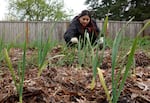Growing up in Guatemala, Alejandro Tecum wanted nothing to do with farming, he said.
“When I was younger, I worked on my parents’ land and I came to hate it with all my soul because it was hard work,” he said in Spanish.

Álvaro Aguilar walks across his two-acre farm in rural Washington County on April 18, 2025. Aguilar took the Adelante Mujeres agriculture course in 2018 and now runs Real Tex Mex with his wife.
Alejandro Figueroa / OPB
“We were killing the soil, every year we were killing the soil,” he said. “It wasn’t until I learned that there was a way to practically do nothing and let the soil heal on its own that I got hooked.”
Tecum now lives in a region of Oregon with some of the most rich, productive soils in the country – the Willamette Valley. It’s also a region with a large percentage of Latinos. He leads a program in Washington County, where only about 7% of farms are Latino or Hispanic owned, that seeks to help aspiring farmers or home gardeners successfully grow their own food or market their own produce.
In person, Tecum is a burst of knowledge, dense with information and always ready to explain why soil is so important with a story.
“Nature is totally designed to sustain itself for years and years, but we, with our ambition, our greed, we want to do it as quickly as possible,” he said on a recent spring day, as he looked over a community garden still dormant from the winter months. “If we really want to produce nutritious food, delicious food, because that’s the other thing, we want to produce delicious fruit and vegetables, we have to improve the soil. There’s no other way. The soil is the key.”
If the soil is the key, as he says, then language barriers, limited access to land, and a lack of financial resources or federal loans and grants may be the locks that keep the door shut on some Latino, immigrant or other farmers of color. Tecum hopes to help more people unlock those barriers.

Alejandro Tecum talks about fertilizers and cover crops at a class on April 7, 2025. Tecum is the regenerative agriculture education and farm incubator coordinator at Adelante Mujeres.
Alejandro Figueroa / OPB
Nonprofit Adelante Mujeres was founded to support Latina women and their families through education and leadership training. For two decades, its regenerative farming and land access program has been focusing on the importance of soil health, soil conservation and pest management, and it’s entirely taught in Spanish. More than 400 people have graduated from the program in just the last seven years.
Some Latino or Hispanic immigrants bring their culture and farming knowledge because they grew up farming in their home countries. Some want to know how to do it better, or they might do it for the cost benefits of home gardening, while others might want the boost to start their own farm, Tecum said.
Mother-and-daughter Floriceda Francisco and Petrona Dominguez are graduates of the program. They now have a small plot at a community garden where Adelante students learn to work the soil.

Petrona Domingez (left) and Floricelda Francisco weeding their plot at the Juniper Garden in Forest Grove, April 10, 2025. Both Francisco and her daughter took the agriculture courses with Adelante Mujeres.
Alejandro Figueroa / OPB
On the same spring day that Tecum visited Juniper Garden to talk about his work teaching people about agriculture, Francisco plucked weeds that grew between the garlic she planted last fall.
She and her daughter have been applying what they’ve learned from Tecum. They’re building up healthy soil, working in compost to feed the microbes, and covering it with leaves so that the soil keeps its moisture.
“This year we’re going to plant tomatoes, chilies, cucumbers, peas, radishes, onions and watermelon,” Francisco said in Spanish.
Francisco grows her produce just to have fresh fruits and vegetables for herself and her family, but others manage to break through and launch their own farm business or food stand.

Petrona Dominguez weeding a bed of garlic at the Juniper Garden in Forest Grove, OR., April 10, 2025.
Alejandro Figueroa / OPB
People who successfully complete the 14-week course become eligible to receive technical assistance, access to land, attend farm workshops, business development, access to the community garden and the local farmers markets in Forest Grove and Cornelius.
There are many more people that want to do this work, or at least want to learn, Tecum said.
Álvaro Aguilar is one of them. He grew up on an avocado farm in Mexico, but it wasn’t until 2018 that he considered farming as an option. Until then, he had been working at a local Mexican grocery store, which is still his daytime job.
The catalyst to all of this was when he lived in an apartment with a toddler who was starting to run around the house, and noticed a bookcase they had in the living room wasn’t safe for her. So he decided to give it another life.
“[Back then] she loved to see how plants grew every time we went to the garden section of a store. She’d go to the flowers and start asking, ‘And what is this, and what is this,’” he said. “So I said, ‘Well, let’s use the old bookcase outside in the back of the apartment’. So I threw it on the ground. I put some wood planks underneath it, drilled some holes and filled it with dirt.”
Aguilar’s wife told him about Adelante, and he signed up for the program’s agriculture classes. The knowledge he gained there led him to build up a small garden after they bought a house with a backyard.
He now leases a small farm, just about two acres, called Real Mex Fresh in rural Washington County. He runs it with the help of his wife and their two children. There, they grow all sorts of produce such as peppers, zucchini, squash and tomatoes. It was a steep learning curve, he said, recalling the first year he and his wife opened a food stand and produce stand at the Cornelius farmers market.
Days after planting a bed of lettuce, Aguilar surveyed his field. He was still setting up the irrigation lines and spreading the compost he had bought from a local farm.
He joked lately he’s been fighting against gophers eating the garlic he’d planted last fall.
“I don’t know why they love it, but it’s their favorite,” he said, adding they prefer eating his elephant garlic varieties the most.
Aguilar and his wife have also opened a catering business.
“We learned a lot. It was something we knew how to do because we have always worked in commercial kitchens and in food retail, but only as workers,” he said “That year we had to do the licenses, the permit and the registration. It was organized chaos.”
Now they’re working on securing the permits for a food truck they recently bought. It’s a lot of work, he said, and it’s risky. But for him, it’s more than just a business.
“I don’t want to be guided solely by that,” Aguilar said. “What keeps me here is that I’m, in a way, taking care of the environment and ensuring that my community eats healthy food.”

Alejandro Tecum talking about soil health and cover crops at a class in Forest Grove, OR., April 7, 2025.
Alejandro Figueroa / OPB
At the community garden, Tecum reflected on that connection between the environment and the food, as he bent down to scoop up a clump of dark, rich soil with his hands.
If there’s at least one door he’d like to unlock for his students, it’s an understanding of healthy soil.
“For me, it’s like a reward every time I go to someone’s [garden] because I see them, I see what they do. Sometimes they do it better than me because I don’t have much time to do my own thing. I leave full of satisfaction, joy and hope for those people.”
